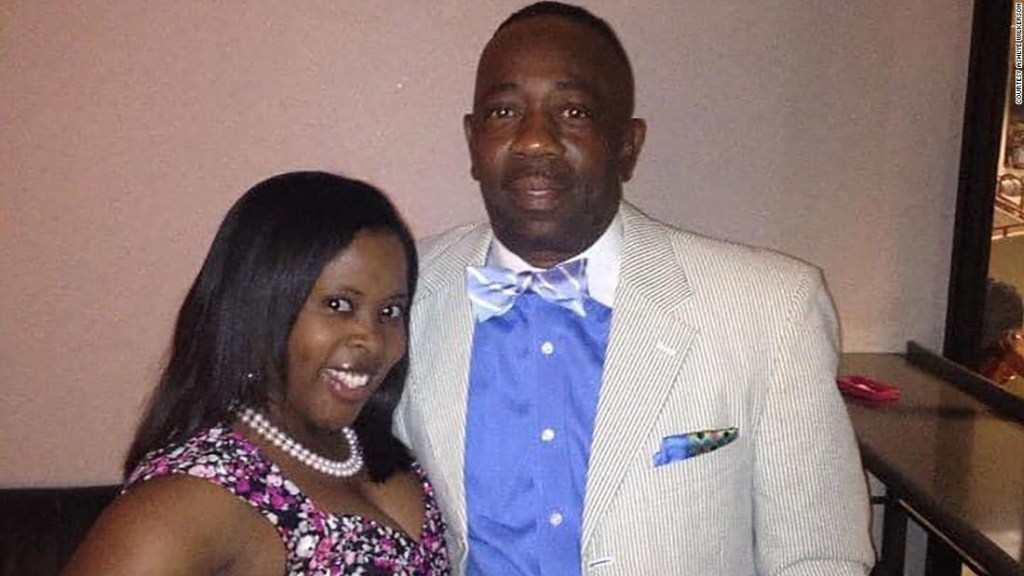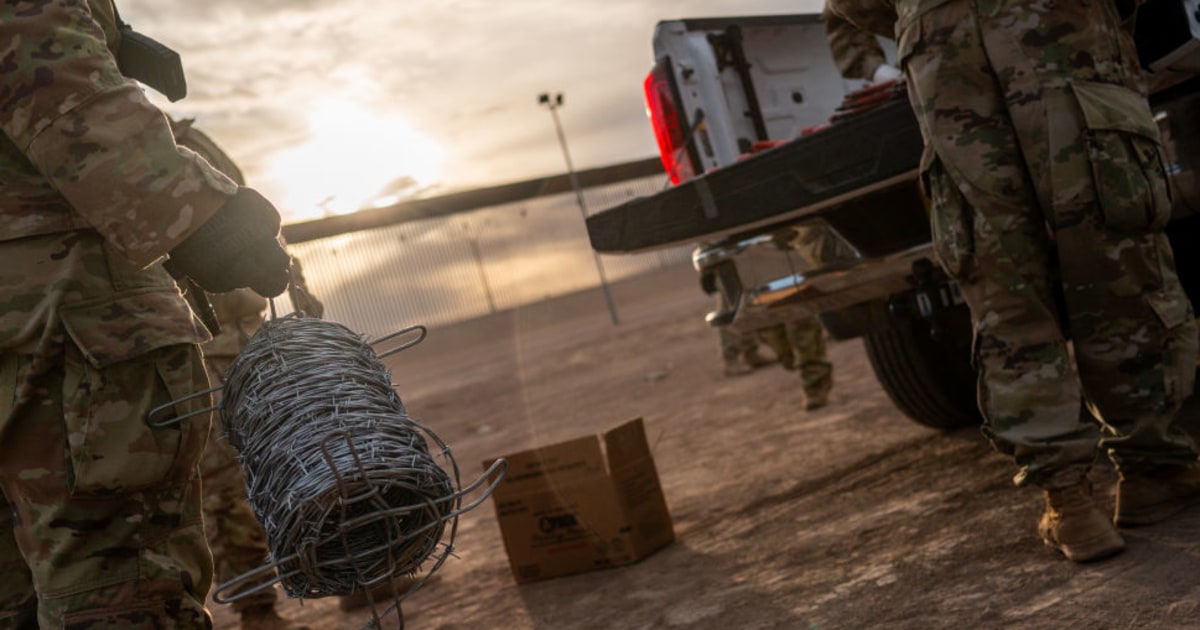This routine traffic stop involving Anthony "Tony" Geddis, a passenger in a car driven by his daughter, and State Trooper Jaret Doty went viral.
(CNN) --
At first glance, it looks like another one of those viral photos that we can hardly see anymore.
It shows a white state trooper and a black man during a traffic stop on a bright, sunny day.
The cop reaches his broad arms through the open passenger window to grab the black man's right hand.
The man has his back against the passenger seat and his eyes closed.
He looks like he's wincing.
But this photo is being widely shared for another reason.
The policeman is reaching into the car to help, not to hurt.
And the encounter was described by those who witnessed it not as tragic, but as inspiring.
"It was a really beautiful moment for me to see this meeting between my father and the agent unfold," said Ashlye V. Wilkerson, the 39-year-old driver of the car who secretly took the photo.
The state trooper is still having a hard time digesting what happened that afternoon.
"It's one of those things that I can't explain," said Police Officer Jaret Doty of the North Carolina State Highway Patrol.
advertising
Doty thought that today she was stopping a stranger.
It turned out that she had passed the same path as the man she held by the hand.
A "daddy's girl" taking care of her sick father
Their chance encounter took place on March 28, a Monday afternoon.
Wilkerson was driving his silver 2016 Volvo south on Interstate 85 in Rowan County, North Carolina.
He had picked up his father, Anthony "Tony" Geddis, who had just finished a round of chemotherapy treatments at Duke University Medical Center, and was driving him back to his home in Columbia, North Carolina. South.
The roles of father and daughter were reversed that afternoon.
All of Wilkerson's life, her father had been the one to take care of her.
She never seemed to miss a parent-teacher conference, she'd take her to cheer practice or go to high school football games on Friday nights to watch her cheer for her team.
Although she grew up, married, and had two children, she still called herself "a daddy's girl."
She liked to spend time with her fashionable father, who often wore cowboy boots with starched pants,
Unforgivable
cologne, and shirts monogrammed with her initials, TG.
Ashlye Wilkerson with her father, Anthony "Tony" Geddis, at one of the many events they attended together.
An adjunct professor, author and speaker, Wilkerson said she often asked her father to accompany her to events her husband, Kobie, couldn't attend.
"My father was my favorite person in the world," he said.
"Even as an adult I called my father to be my escort."
At 2:15 p.m. that afternoon, Wilkerson heard a siren and saw flashing blue lights in his rearview mirror.
"Oh, God, I'm speeding, Dad," he said.
"Okay. It's fine," he said, trying to calm his daughter.
In Wilkerson's backseat were his daughters, Alana, 8, Ariah, 5, and their mother, the Rev. Fannie M. Geddis.
She stopped on the right side of the highway and waited.
The family had well-documented reasons to be concerned.
For many black motorists, there is no such thing as a routine traffic stop.
Wilkerson had seen numerous videos of unarmed black drivers killed by law enforcement officers who acted recklessly.
"We were very aware of how things can develop," he said.
At the same time, Wilkerson says he didn't want to prejudge.
He tried to keep an open mind as the police officer approached the passenger side of his car.
"I don't think it's fair to characterize everyone based on someone's actions," he said.
A tense wait during a traffic stop
His father, Geddis, had already rolled down the window when the policeman reached the vehicle.
Doty, a compact man with a shaved head, introduced himself.
He has been a state trooper for 17 years.
He decided to become a police officer as a teenager, after losing a childhood friend to a drunk driver.
"Ma'am, do you know how fast you were going?" he said after introducing himself.
"I'm going to need your license and registration."
Wilkerson excused himself and reached into his glove box.
Geddis was so weakened from chemotherapy treatments that he could barely speak above a whisper.
But he got up to defend his daughter.
"It's my girl," he told Doty.
"She's taking me home from chemotherapy treatment at Duke Cancer Center."
Doty said nothing and nodded.
She took Wilkerson's data and went back to her car.
Wilkerson and his family waited.
And they waited.
"God, why is it taking so long?" Wilkerson said to his father.
"I wonder what's going on."
North Carolina State Trooper Jaret Doty.
His unexpected gesture comforted the family of a stranger.
But Doty, 45, wasn't just reviewing Wilkerson's information;
she was reviewing her own life.
He told CNN that he had become an expert at reading people's body language as they approached stopped cars.
He soon realized that Wilkerson's father was hunched over in the seat, weak with pain.
She also realized that the man was rushing to protect his daughter by speaking on her behalf.
Doty recognized that instinct.
She shared it.
Doty is the father of a 12-year-old girl, Avery.
She is also a cheerleader, as was Wilkerson.
Doty and her wife, Abby, have taken her to numerous cheerleading competitions.
They care about Abby and Ella Cooper, 15, and have taken them to Walt Disney World in Florida at least seven times.
"I realized she was a daddy's girl," Doty said of Wilkerson.
"I would do the same for my daughter."
A state trooper makes an unusual decision
But Doty also felt that she shared another connection with Geddis.
She noticed that Geddis had a bag attached to her pelvic area.
Doty had once been diagnosed with ulcerative colitis and had to have surgery to remove part of her colon.
He also had to wear a bag attached to his stomach for his treatment.
The disease went into remission, but it came back "with force", weakening her body so much that she had no strength to leave the house.
"I felt like I was dying," he says.
Doty says doctors told her she probably would have gotten colon cancer if her disease hadn't been treated.
As she recovered from the operation in the hospital, Doty made a promise.
He thought of all the people who had prayed for him and given him advice.
"I said if I could help one person, or help someone get over their illness, I would do it."
Doty thought about that promise as he sat in his squad car, wondering what to do next.
He knew he wasn't going to ticket Wilkerson for speeding.
But was there anything else he could do?
Doty closed her ticket book and opened her car door.
She went back to Wilkerson's car and addressed Geddis.
"Sir, do you mind if I ask what kind of cancer you have?"
"No, I don't care. I have colon cancer."
Doty took a deep breath and looked at Geddis.
"Can I pray for you?"
Doty said.
"Of course," said Geddis.
"I absolutely believe in prayer."
Ashlye Wilkerson with her father, Anthony "Tony" Geddis, and her mother, the Rev. Fannie M. Geddis.
Wilkerson's mother was in the back seat of her daughter's car during the traffic stop.
Geddis was president of the board of deacons at his church, and his wife was a pastor.
He had done private Bible studies with his wife at home.
He quoted passages from the Psalms and loved the hymn "Jesus, keep me close to the cross."
And he had created a ministry to personally mentor young black men.
Geddis raised his right hand and grasped Doty's.
Both men bowed their heads.
"Father in heaven…" Doty began.
Wilkerson was so moved by what she was seeing that she took out her smartphone and silently took a photo.
When Doty finished praying, she pressed something into Geddis's hand.
"I just want you to know that you have someone else praying for you on your journey," the policeman told him.
Doty turned from the car window and said goodbye to Wilkerson and her father.
Instead of giving Wilkerson a speeding ticket, she let her go with a warning.
"Drive carefully," he said.
Wilkerson started the car and drove off, trying to digest the encounter.
His father hadn't even told many of his closest friends that he had cancer because he didn't want them to worry.
His father didn't speak as they walked away, but he could tell that he had been touched by Doty's gesture when he glanced at her.
His eyes filled with tears.
A private moment becomes an inspiring story
Two months later, Wilkerson's time for tears came.
His father died on May 22, after colon cancer had spread.
She was 61 years old.
Several weeks after his funeral, she was thinking of her father when her thoughts returned to that encounter on the road.
She thought of how, despite her weakened physical state, her first instinct was to protect her.
He went on LinkedIn and posted a tribute to his father, written as if he were speaking directly to him.
She recalled the traffic stop and how, "like you always did, you quickly came to my defense."
Jaret Doty with his wife, Abby, and their children, Cooper and Avery.
Doty was unaware that the traffic stop had drawn national attention until months later.
And then he thought of the state trooper, whose name he didn't know.
"Thank you from the bottom of my heart to that agent who prayed for you and with you that day," he wrote.
Wilkerson also posted the photo he took at the time.
His post quickly gained attention on LinkedIn and spread to Facebook, Instagram and Twitter as people reposted the image and the story behind it.
Wilkerson has received more than 4,000 comments from a wide range of people, many of whom said the traffic stop had restored some of their hope in humanity.
So he added a bold posthumous message to his father.
"Don't bug me too much," he wrote.
"I know you didn't like to post on social media yourself. But you're too amazing not to talk about yourself. I love you dad. Your legacy is safe with me."
His story ended up reaching the North Carolina State Highway Patrol.
A spokesperson for the company sent a message to Wilkerson.
"We are deeply saddened by the loss of your father, Mrs. Wilkerson," it read.
"We are grateful that our member was able to offer a moment of compassion and comfort to you and your father while you were in North Carolina. Thank you for being so gracious in capturing the moment and sharing it with others."
And then word of the story reached Doty.
She took him by surprise.
He didn't know what had happened to Geddis or that a photo of their encounter had been taken.
In an interview with CNN, his voice turned solemn when told of Geddis's death.
"It's not about me at all," he said.
"I don't want any recognition. I didn't do anything. This man lost his life, and his daughter is honoring him. I want her to be able to honor him however she wants, and not because of anything I did."
Doty said he often prays in private for the people he detains.
However, Geddis was different.
"This was the first and only time I ever verbally asked and prayed for someone out loud on the interstate," he said.
He is still shocked by the timing of their meeting.
"I can't describe the odds of stopping it, because there are hundreds of thousands of cars going down (Interstate) 85 every week," he said.
Wilkerson has more than a photo to remember that encounter.
He also has something else.
Doty placed a pocket-sized object in the palm of her father's right hand during their shared prayer.
His father kept it in his dresser until the day he died.
"My mother gave it to me after she died," he said.
"And I keep it on my dresser."
The memory is a token of another bond her father shared with Doty.
It is a silver metal cross.
Ashlye Wilkerson keeps this silver cross as a souvenir from the traffic stop.
Policeman









